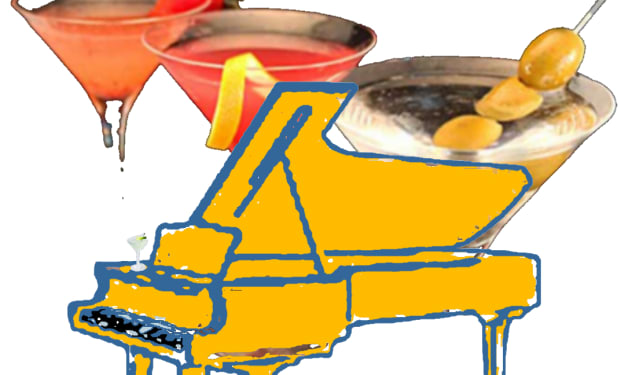
First quarter, waxing gibbous, full moon.
Lady Luna watches from the sky as she always has. The phases are only perceived from the planet, of course. A person standing on the Moon sees the same phases, in reverse order, on the glowing blue planet below.
At least, that’s what they teach in Academy.
Tikvah dreams of standing on the Moon. She dreams of a blue planet below her, waning gibbous, incandescent azure. The dreams fill her mind. There is no room for mathematics; her mind is full of the sky.
The sky used to be blue, too, which isn’t part of any Academy curriculum. The past cannot be tested or measured. The sulfur made the sky yellow so long ago that to assert that the sky had once been blue would be considered heresy, if heresy still existed. There is no religion, any more than there is art, or music. The world is. The world has always been.
The planet is blue from space, though. Sol’s light still reflects off hydrogen hydroxide molecules, scattering the wavelengths between 450 and 480 nanometers, absorbing the rest, so the blue planet keeps its name. Even atmospheric sulfur can’t obscure all that water.
Tikvah tries to forget about blue skies. She isn’t supposed to know about them in the first place.
* * *
Tikvah understood Algebra perfectly. She knew how to simplify rational expressions using common monomial factors. Still, as she stared, numbers raced around, trading places, trading shapes. Nines overturned, dressed as sixes. Threes became eights. Fives and twos were forever playing tag, and she couldn’t keep them straight. When tears filled her eyes until the numbers were swimming instead of just running, she gave up and answered the questions using whatever numbers she saw at the time, but even the numbers she wrote herself changed shapes in the middle of the problem, and instead of 27 she wrote 48, the correct answer for six times eight, but not at all correct for nine times three. Then, of course, the common factor came out wrong and the whole exercise was one long mistake.
Tikvah didn’t even bother trying to hide her marked-up assignment, mistakes circled in red, in her backpack before her classmates saw. They all knew.
She did try taking another new route back to the dormitory. If she heard the whispers, it would take her an extra hour to get her mind clear to redo the problems, which would take hours as it was. Forget evening meal, forget bed. She would sleep at her desk again. Tikvah hadn’t slept in her bed in two moons.
She had already tried circling one block out of her way in every direction, then two blocks. Still she had heard at least one group of fourteen-year-olds. Today she tried three blocks north, since the dormitories were south. It should have been far enough.
She had forgotten that Shira didn’t live in the dormitories. She had enough merits to live in the skyscrapers. Worse, she had forgotten that today was Shira’s fifteenth Solar orbit celebration, so Noa and Talia would walk with her to the social. When she saw them at the end of the third block, she froze. Don’t let them turn this way.
They turned toward her.
Tikvah ran. Running on a public street was not allowed, and Tikvah couldn’t afford any more demerits, but she ran anyway. She dodged behind a communications booth, but when she stuck her nose out, she saw the three girls still coming her way. They stopped to talk; of course Shira had merits to spare and could enjoy a chat instead of rushing to do homework.
Tikvah waited until she was sure Shira’s attention was fully on her friends. Then she ran again. She thought she heard one of the other girls, Noa maybe, saying her name, but she didn’t stop or turn around. If she ran fast enough, no one would know who to report.
When she stopped, Tikvah had no idea where she was. This part of the city wasn’t familiar. Everyone around her was mature, and had clearly passed all their exams—not just the first ones to get sorted into a training Track, but the second ones to start their Vocations.
Where am I?
If she could figure out which Vocation the building represented, perhaps she could use that information to decipher which quadrant she had run to. Pressing herself flat against the wall, Tikvah squinted around at the Vocationers, looking for the scrubs of healthcare or the coveralls of engineers or the uniforms of patrol as a clue. No luck; these men and women wore neatly pressed suits, which could belong to law or business or analysis or any of dozens of other Vocations.
Maybe the next block would be easier?
Tikvah began to edge away from the wall. No one had noticed her yet, and perhaps if she just walked around the block—
“Good afternoon.”
Tikvah froze for the second time.
“Don’t worry, I won’t tell patrol.” The whisper came right behind the standard greeting, and it gave Tikvah enough courage to look up at the person who was talking to her. The girl was tall, willowy, maybe a year older than Tikvah, with dark hair cropped in a pixie cut completely unlike the braids expected of fourteen-year-olds, and really, quite unlike the clean ponytails worn by those already on their Tracks, or the tight chignon worn by a female Vocationer.
In a normal voice, the girl was speaking again. “Ten past four. Time for tea soon.” Then, in a whisper. “You look like you may enjoy beauty. Will you come?”
Without explaining what she meant, the girl opened a door behind Tikvah. Cool air flowed out, and with it, a swirl of sound—not noise, like Tikvah was used to from the Academy, but sound, and oh, what a sound. It made her feel, though she couldn’t identify the feeling.
The girl slipped through the door and disappeared, taking the swirl with her.
Tikvah blinked. She was still standing on a block she didn’t recognize, and she was alone again. If patrol found her, asked her what she was doing, the demerits might be enough to cost her the privacy of her dormitory. If I can’t hide in my dorm alone, I will never pass Algebra.
She remembered that swirl of sound.
Tikvah pushed open the door.
* * *
A smile. “Courage. Good. Come this way.”
“What is the sound?”
The pixie grinned. “Music. Come in; I will show you so many things.”
* * *
Words that Tikvah heard for the first time:
- Music
- Klezmer
- Clarinet
- Melody
- Dance
- Dream
* * *
"Why salon?"
"It's a historical word meaning a gathering of artists."
“What are artists?”
“People who make, create, do things. Like this painting.”
“The sky isn’t blue.”
“It used to be.”
"Why does music make me feel?"
"No one knows. They know the sound is produced when the reed vibrates against the mouthpiece, and they know that the speed of the air and the length of the tube change the frequency of the sound waves. They know faster, shorter waves sound higher." The melody of the clarinet climbed higher as the pixie spoke. "No one knows why it gives you chills."
They both shivered, Tikvah grinning as she did so. Then she became thoughtful again.
"I see," she said. "That's why it isn't allowed. Because it can't be explained."
Tikvah and the pixie spoke in unison. "Only what we can test and measure is real."
The pixie smiled at Tikvah. "Once you've heard music, you will never forget."
* * *
Over the next moon, Tikvah forgot to be nervous. Numbers still changed places and shapes, but she thought of it as dancing now, and it made her smile. Then, smiling, she would take a calming breath and fill her mind with music, counting the notes of each melody and matching them to the numbers on the page. When the numbers changed, she remembered the melodies, and ignored the black squiggles.
She didn't make friends with any of the other fourteen-year-olds. They still stared at her and whispered.
Since she couldn't talk to them about going to the salon anyway, she wasn't really sorry not to be invited to socials and soirees. The pixie had a name, Feya, but when Tikvah learned that pixies were magical (and once she had asked a lot of questions about magic, another new word), she kept thinking of her new friend as "the pixie."
* * *
"Read this one for me." Tikvah touched the poet’s name shyly: Emily Dickinson. She liked to hear the poems aloud. Letters didn't dance as fast as numbers, but they still waltzed serenely around the page, and the pixie always read not only the words but the meanings.
The pixie read:
“Hope” is the thing with feathers —
That perches in the soul —
And sings the tune without the words —
And never stops — at all —
And sweetest — in the Gale — is heard —
And sore must be the storm —
That could abash the little Bird
That kept so many warm —
I’ve heard it in the chillest land —
And on the strangest Sea —
Yet — never — in Extremity,
It asked a crumb — of me.
Tikvah thought for a few minutes when the pixie stopped. "Hope,” she said finally. “A new word. What is it?”
The pixie never answered questions like that. “What do you think it is?”
Tikvah thought some more. “Desire, I think, and… something more… light, but inside you, instead of in the room. For when you think things won’t, they can’t, be okay, you still have hope.” She drew breath. “Am I close?”
The pixie laughed. “Hope is one that doesn’t really have a dictionary definition. That’s why they stopped using it. But I think you’ve got it right. Light, but inside you. For when the world is dark.” She took a little box from her pocket. “I have something for you.”
“For me?”
“Yes, for you. Your name means hope, did you know that?”
“I didn’t know names meant things.”
“They used to, when this was made.” She handed Tikvah the box. Inside was a gold chain—Tikvah had only ever heard of gold—and from the chain hung a small gold heart. “It’s called a locket,” the pixie told her. “It has a secret inside.”
Tikvah noticed the seam on the side of the heart, and opened it. Inside was a six-pointed star. She stared for a long time. “This makes me feel things, too,” she said finally.
“I’ll tell you more about them,” the pixie promised. She fastened the chain around Tikvah’s neck.
“Will people notice me wearing it?”
“Most people won’t. They won’t understand it, so they won’t notice it. If anyone does notice, you will have hope for that person.” The two girls smiled together.
* * *
Tikvah stood on a balcony at Academy. Her gold locket glinted in the sunlight. A voice was beside her.
“You’ve had that thing for a while now.”
“About a moon,” Tikvah answered, not turning. Her heart was racing. The pixie had been right, no one had noticed—except, apparently, Shira.
“I feel something when I look at it. I’m not sure what,” Shira whispered. Tikvah couldn’t keep steady anymore. She glanced quickly around, but they were the only two on the cold balcony.
“That’s because it’s beautiful,” she whispered back. “It has beauty.”
“What’s beauty?” Shira asked.
Tikvah smiled. “I’ll show you.”
* * *
Tonight, Tikvah stops trying to forget about blue skies.
Instead, she squints up at Lady Luna. She and Shira have agreed that they will go there. “When beauty doesn’t have to be secret,” Shira says.
Tikvah grins. They still haven't worked out the details, but she is sure they can do it. Because my name means hope. Hopeful feathers flutter under her ribcage as she turns towards Graduation.
About the Creator
Enjoyed the story? Support the Creator.
Subscribe for free to receive all their stories in your feed. You could also pledge your support or give them a one-off tip, letting them know you appreciate their work.





Comments
There are no comments for this story
Be the first to respond and start the conversation.